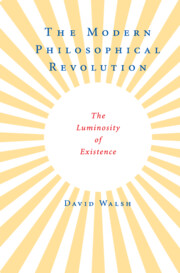Book contents
- Frontmatter
- Contents
- Preface
- Introduction
- 1 Kant's “Copernican Revolution” as Existential
- 2 Hegel's Inauguration of the Language of Existence
- 3 Schelling on the Beyond of Existence
- 4 Nietzsche: Philosophy as Existence
- 5 Heidegger's Achievement Despite the Betrayal of Philosophical Existence
- 6 Existence Without Refuge as the Response of Levinas
- 7 Derrida's Dissemination of Existence as Différance
- 8 Kierkegaard's Prioritization of Existence over Philosophy
- Epilogue: Modernity as Responsibility
- Works Cited
- Select Bibliography of Secondary Sources
- Index
6 - Existence Without Refuge as the Response of Levinas
Published online by Cambridge University Press: 05 June 2012
- Frontmatter
- Contents
- Preface
- Introduction
- 1 Kant's “Copernican Revolution” as Existential
- 2 Hegel's Inauguration of the Language of Existence
- 3 Schelling on the Beyond of Existence
- 4 Nietzsche: Philosophy as Existence
- 5 Heidegger's Achievement Despite the Betrayal of Philosophical Existence
- 6 Existence Without Refuge as the Response of Levinas
- 7 Derrida's Dissemination of Existence as Différance
- 8 Kierkegaard's Prioritization of Existence over Philosophy
- Epilogue: Modernity as Responsibility
- Works Cited
- Select Bibliography of Secondary Sources
- Index
Summary
The tragedy of philosophy, although inseparable from the tragedy of Heidegger, was nevertheless different. In its finality toward openness, philosophy exceeded the limitations of even its most brilliant practitioners. This was the post-Heideggerian path in which philosophy employed his undeniable accomplishments to remove the restrictions that accomplishments as such impose. Philosophy can no more regard itself as the end point than it can encompass that by which it is. The existential shift under way since the time of Kant, having been diverted from its further realization, could now resume its unfolding. Even a contemplative apocalypse could not stand in the way of the apocalypse of contemplation. The value of a great thinker is not confined to his positive contributions but extends to the errors that are not just mistakes. Philosophical errors are glimpses of the fatality of philosophy itself. Any account of the full measure of Heidegger must take both dimensions into consideration. His best readers are thus challenged not only to reach up to the revolutionary opening of philosophy he wrought, but also to extend it through the exercise of a self-critique at which he proved insufficient. Such a profound critique and extension is the work of Emmanuel Levinas, whose existential thrust opened up a new phase in the unfolding of the modern philosophical revolution. His was the voice of an authority distinctly different from that of the mentor from whom he progressively withdrew.
- Type
- Chapter
- Information
- The Modern Philosophical RevolutionThe Luminosity of Existence, pp. 291 - 334Publisher: Cambridge University PressPrint publication year: 2008



